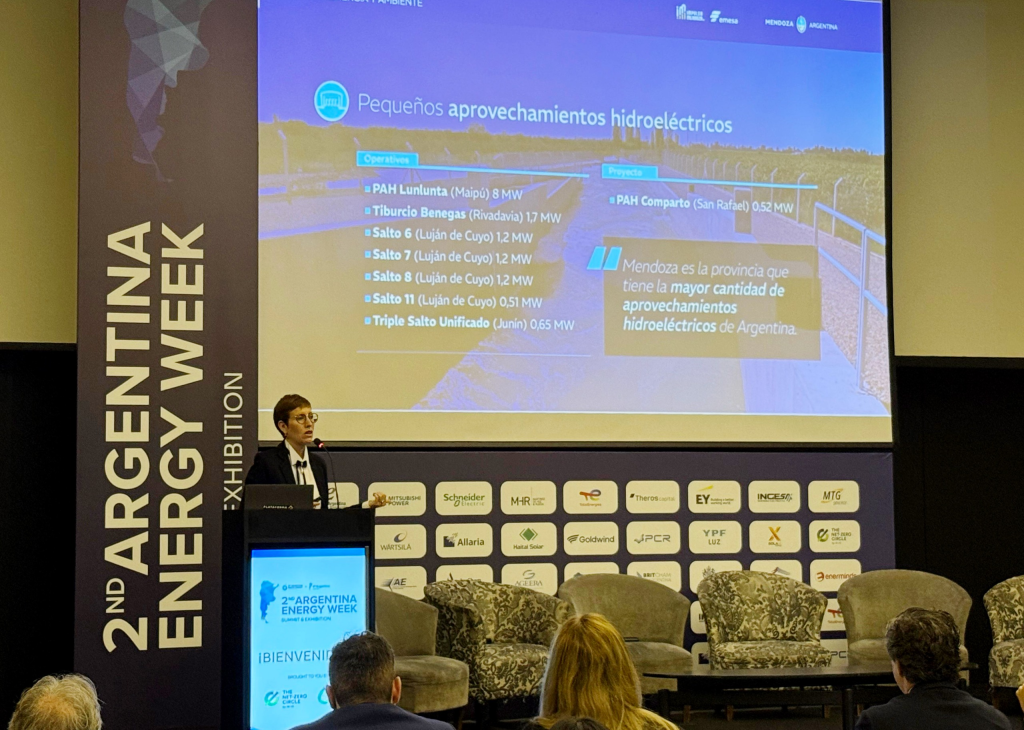The Minister of Energy and Environment opened the conference with a presentation on progress and long-term planning in the province’s energy sector. She also announces that Mendoza will host Latin America Financial Day in November, a meeting that will bring together the leaders in mining finance worldwide.
The Minister of Energy and Environment, Jimena Latorre, officially opened the Argentina Energy Week & Exhibition, the international summit organized by The Net-Zero Circle and The Energy Circle by IN-VR in Buenos Aires. She also announced that Mendoza will host Latin America Financial Day on November 14, following the Argentina & LATAM Lithium Summit 2025 in Buenos Aires.
“Mendoza will host a Latin American finance summit to discuss the challenge of critical minerals in Argentina, particularly positioning Mendoza as a financial hub,” said the minister, who confirmed that the Toronto Stock Exchange (TSX) —one of the world’s most important stock exchange for mining— will join the event in the province, as it did at the Sustainable Mining Summit 2024.
The official announced this exclusive networking and business opportunity event, attracting more than 200 leaders in the field from Latin America and the rest of the world. She invited all participants to the meeting, turning Mendoza into a strategic center for financing mining projects’ exploration, development, and expansion.
“The goal is to capitalize on the great international interest in the development of mining in the Andean region, understanding that financing will be a key component in ensuring its orderly growth,” she said.
From the oil and gas tradition to the renewable transition
Latorre stressed that all actions and long-term planning aim to achieve “a realistic energy transition,” capable of taking advantage of current resources while strategically planning the future matrix. “It is about thinking about the intelligent use of resources to ensure the availability for future generations,” he said.
He recalled that Mendoza was historically an oil-producing province, ranked among the top three producers in the country. However, he warned that the decline in conventional oil and gas production is due to decades of lack of exploration and a national context of greater competitiveness in shale development (fine-grained, laminated sedimentary rock).
In response, he explained that the province is promoting efficiency and tertiary recovery policies in mature fields, accompanied by technological investments that ensure the continuity of the industry and the supply of the YPF refinery, the second largest in Argentina.

At the same time, he highlighted Mendoza’s potential in Vaca Huerta, where the provincial territory contains 30% of the formation. YPF has completed a hydraulic fracturing process in two wells in Malargüe with investments of US$17 million, further exploration commitments amounting to US$30 million, and the entry of the Quintana-TSB joint venture for new investment.
Hydropower and renewable energies, drivers of the transition
Latorre explained that Mendoza has a long history of hydropower generation, which today represents a fundamental contribution to its energy matrix. “Currently, 60% of the province’s installed power comes from renewable sources, a figure higher than the national average,” he said.
Regarding solar energy, the minister highlighted the construction of large-scale photovoltaic parks, including YPF Luz in El Quemado (305 MW) and new plants in Anchoris, Malargüe, and San Rafael. “Mendoza has enormous potential for photovoltaic generation, and we are working on expanding the transmission network to support this growth,” she said.
Infrastructure and incentives are the foundations for development.
The officials warned that consolidating the transition will require consolidating the electrical and transportation infrastructure after decades of investment. For this reason, Mendoza is currently financing the construction of four new transmission lines that will connect renewable parks and increase generation capacity.
She also highlighted that the province offers specific tax incentives for renewable energy, such as exemption from gross income and stamp taxes, as well as differentiated regimes for industrial production.
With this strategy, Mendoza seeks to integrate competitiveness, sustainability, and social consensus. “Our vision is that, over the next 50 years, the province will move forward steadily, with energy security for the people of Mendoza and the ability to attract investments that will consolidate it as a hub for modern mining and a national energy benchmark,” conclude Latorre.
Government round table
After opening the conference, Latorre participated in the round table “Government: Vision 2030 — Argentina’s Energy Future,” Along with Pablo Bereciartua, Minister of Infrastructure and Mobility of the City of Buenos Aires, and Matías Toso, Secretary of Energy and Mining for La Pampa.
The roundtable discussed plans and visions for the country’s energy transition, addressing issues such as incorporating new technologies, diversifying the energy matrix, interjurisdictional cooperation, and a mechanism to attract sustainable investments that will enable progress toward a more competitive and environmentally friendly model.
The second Argentina Energy Week Summit & Exhibition will unite national government officials, investors, energy producers, and renewable project developers for three days. The aim is to connect the country with strategic international partners and showcase the investment opportunities in clean and sustainable energy.


